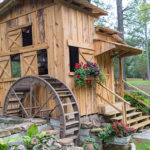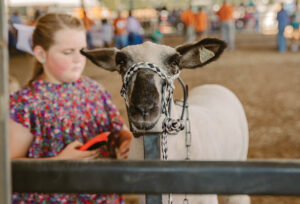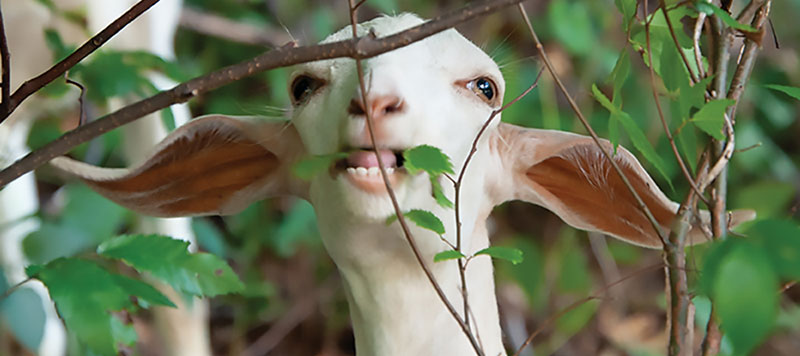
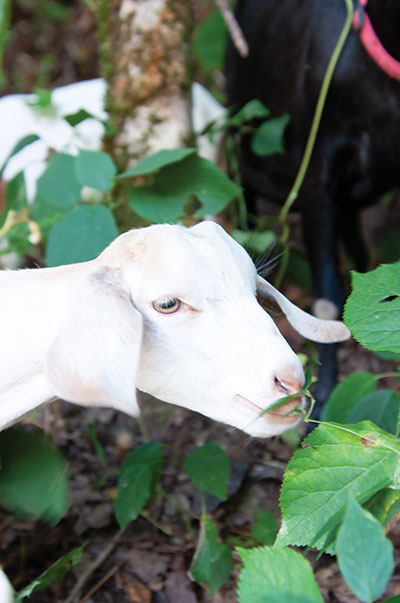
Rental ruminants help clear kudzu from Ashville farm
Story by Carol Pappas
Photos by Wallace Bromberg Jr.
Cindy Massey took more than a casual look at the kudzu-covered cliffs that surrounded her Ashville farm and knew she had to put a stop to the invasion.
Wikipedia, the online encyclopedia, describes the invading kudzu as climbing, coiling and trailing perennial vines introduced in America from Asia in the 19th Century. It’s even earned the infamous reputation as ‘the weed that ate the South.’ But never mind the lore behind it. All Massey knew was that it had to go.
She had kept it under control for years through a treatment process. But when that process was skipped a couple of times, the vines enveloped the hillsides and rock formations – top to bottom – that form a natural, dramatic backdrop all around her expansive valley acreage. That is, when you can see them.
She asked her landscape architect, Rodney Griffin at Gardens by Griffin, for advice, and his answer would set in motion a solution not seen all that much around these parts. “Why don’t you rent a goat?”
It was no time for conventional means anymore, said Massey. So, she turned her attention to the internet and made a discovery that’s catching on around the country – renting goats – and lots of them.
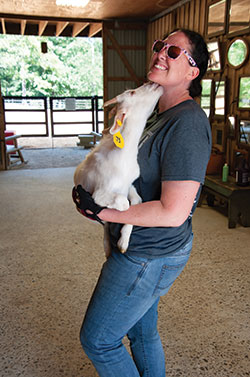 She found a company in Tennessee – Rent-A-Ruminant – that would bring a herd of goats to Alabama and let them do what goats do best. And on a warm, sunny day in August, kudzu started tumbling down like a row of dominos given a mighty thump.
She found a company in Tennessee – Rent-A-Ruminant – that would bring a herd of goats to Alabama and let them do what goats do best. And on a warm, sunny day in August, kudzu started tumbling down like a row of dominos given a mighty thump.
All across Massey’s 135 acres, one by one, members of the herd of 47 goats made their way up and down and all around the hillsides, craning their necks to reach their ‘gold.’ Some stood on hind legs to get an extra boost toward their target. They tracked, tromped and chomped on one hillside and then headed to the next course at Taylor’s direction.
If one man’s trash is another’s treasure, the same holds true for goats. According to Rent-A-Ruminant owner Jax Taylor, kudzu is like the “golden corral” to them. She compared the bottom to broccoli, the next layer to a chocolate fountain and at the very top, they strike gold.
As Maddie, an Anitolian Shepherd, Great Pyrennes mix herded the goats, keeping them inside temporary netting that encloses each section designated for their clearing prowess, Taylor talked of how her story began.
Now a veteran, she was in Kuwait, about to be deployed to Iraq. A library in Los Angeles had donated out-of-date books to soldiers, and she picked up one on suburban homesteading. For the next 15 months, she would read that book over and over again and became “intrigued” with the concept of self-sufficiency and homesteading.
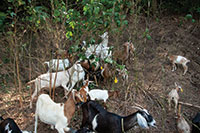 She decided when she returned home, she would buy a goat. And that she did. Her first was a Nigerian Dwarf, Becka, and you might say that goat cleared the path forward for her in more ways than one. After a second tour, this time in Afghanistan, she decided that when her Army career ended, her next career would involve goats. She had already started her farm and had moved to standard sized goats.
She decided when she returned home, she would buy a goat. And that she did. Her first was a Nigerian Dwarf, Becka, and you might say that goat cleared the path forward for her in more ways than one. After a second tour, this time in Afghanistan, she decided that when her Army career ended, her next career would involve goats. She had already started her farm and had moved to standard sized goats.
Her herd has grown sizably since then, and so has the territory for Rent a Ruminant, a franchise company begun in 2004 in Washington State. Besides Taylor’s franchise in Tennessee, there are others in Louisiana and Texas.
This was Taylor’s first time to herd in Alabama, and she settled into a loft apartment above the barn on Massey’s land for the two and half weeks she was there with the herd. She and her goat caravan have traveled to parts of Tennessee, Georgia and Kentucky clearing property and taking care of the environment.
“We try to run the business like animal lovers would run the business,” she said, noting that most are rescues. She calls them by name if they venture where they’re not supposed to go as if they are wandering toddlers.
There are three generations out there, she said, proudly pointing to each. Becka is the matriarch. Fiddle is her first kid, and Banjo is Fiddle’s first kid.
How do they get their names? “Sometimes, they just come to us. Pineapple is “off the wall.” Morgan is named after a niece. Sir Richard? He’s their “problem child.” He jumps the fence. “They do something that gives them a name,” she explained.
Taylor likens their approach to clearing the kudzu to the atmosphere of a Jurassic Park – “like dinosaurs attacking.”
And when they were done, Massey’s property was cleaner that it had been in years. By the end of their stay and multiple work days, Massey was calling the goats by name, too.
“I saw firsthand that running a goat rental business is not for the faint of heart,” Massey said. “Some of our terrain is quite steep and while it was no problem for the goats, Jax and her husband, Mathhew, had to clear brush and install fencing to contain them.
“I love the fact that they demolished a lot of kudzu, and no chemicals were used. I try to be mindful of the wonderfully diverse ecosystem we enjoy here. The goats neutralize seeds in their gut rather than broadcasing them as with a machete or Weedeater.”
She noted that the goats were extremely efficient and worked quickly, returning her property to the picturesque landscape she first fell in love with.
“The goats and the Taylors were a delight,” she said. “I missed the sounds of tinkling goat bells and ‘baaaaah’ after they left.”











